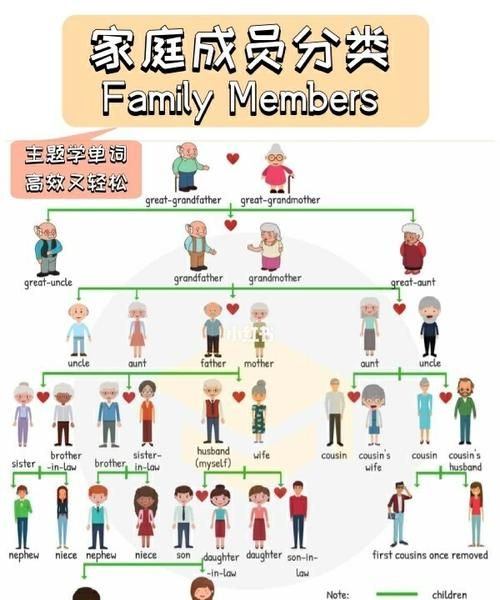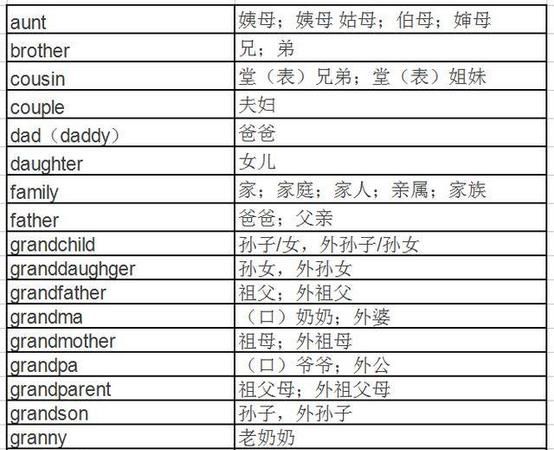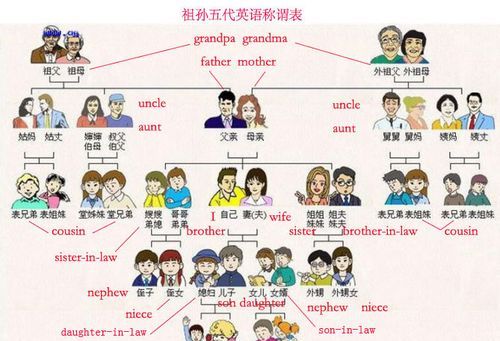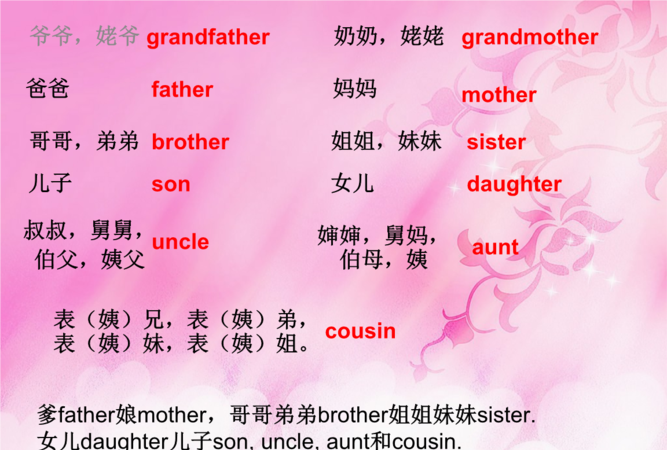本文目录
家庭成员之间的关系英文
家庭成员: great-grandfather, great-grandmother, grandfather, grandmother, father, mother, wife, husband, son, daughter, older brother, older sister, young brother, young sister, grandson, granddaughter, etc.
* 家庭类型: a nuclear / small family核心家庭a big / large/extended family大家庭a single-parent family单亲家庭
* 亲戚关系: grandaunt姑婆,姨婆;granduncle伯公,叔公,舅公,姑公,姨公; aunt 婶母,伯母,姨母,舅母; uncle 叔父,伯父,姑父,姨父; cousin堂兄弟(姐妹),表兄弟(姐妹); cousin-in-law堂姐(妹)夫,堂嫂,堂弟媳,表姐(妹)夫,表嫂,表弟媳; brother-in-law 姐夫,妹夫; sister-in-law姑,姨,嫂,弟媳; son-in-law女婿; daughter-in-law儿媳; nephew 侄儿,外甥; niece侄女,外甥女; grandnephew甥(外)孙,侄(外)孙; grandniece甥(外)孙女,侄(外)孙女; grandson-in-law孙女婿;granddaughter-in-law孙媳妇;etc.
* 常用短语: feed / raise / support a family抚养家庭; found / start a family 建立家庭;family property家产; family financial situation家境; family history家史; family tree家谱;family origin家庭出身; family responsibilities家庭责任; family function 家庭功能; family relationship 家庭关系; family planning 家庭计划; family education 家庭教育; family structure 家庭结构; family ethics 家庭伦理; family consumption 家庭消费;etc.
* 常用句型: 1. What do you want to say about your family? 2. How many people are there in your family? 3. Do you have any brothers or sisters? 4. Are you the oldest/youngest in your family?5. What do your parents do? 6. I grew up in a very close, loving family.7. I keep in touch with my family regularly. 8. I miss my family very much.
2. 实例:考试大论坛
Narrator:
Now first listen to a conversation about the family and say something about Brian’s family. Please Listen Carefully. Lin: Brian, what’s up? You look unhappy. Brian: Oh, nothing particular, Lin. Just that I miss my family terribly. Lin: Me too. How many people are there in your family? Brian: Four. My parents, my elder sister and I. Lin: What do they do? Brian: My father works in a computer company, and my mother is a nurse. My older sister studies in Beijing, and we email each other fairly often. Lin: Are your parents strict with you? Brian: Yes, I think so. When I was at home, I had to clean my own room, help with house chores, finish my homework before dinner time, get back home no later than 9:00 in the evening, and so no. Lin: That’s good for you. Do you get along well with your family? Brian: Sure. I’m lucky to live in a strict yet loving family. I love them. Narrator:
You may begin to prepare your response after the beep.
[2 seconds beep] Preparation time: 15 seconds
Response time: 45 seconds
Narrator:
Please begin speaking after the beep.
[2 seconds beep] ***
Suggested Answer:
There are four members in Brian’s family, his father, his mother, the elder sister and him. His father works in a computer company, and his mother is a nurse in a hospital. His older sister studies in Beijing, and they get in touch with each other by email. His parents are strict with him. When he was at home, he had to clean his own room, help with house chores, finish his homework before dinner time and get back home before 9:00. In short, Brian lives in a strict yet loving family.
词汇与解析: WORDS AND EXPRESSIONS
1. be strict with: 严厉的,严格的 ***
2. house chores: 家务事,家务活
3. get along with: 进展(情况);生活地,(友好地)与……相处
4. get in touch with 保持联系 答案解析:
这是两名学生在讨论家庭的一篇对话。这篇对话传递了三个信息。我们首先了解了Brian的家庭成员(Brian: Four. My parents, my elder sister and I.);其次,了解了Brian父母亲的职业 (My father works in a computer company, and my mother is a nurse.),他的父亲在一家计算机公司工作,母亲是护士。最后,我们从对话中得知,Brian的父母亲对他要求很严格:Brian在家的时候,他得自己打扫房间,帮助父母做家务活,晚饭前必须做完家庭作业,晚上九点之前必须回家。这些具体事例有力地证明了Brian的父母对他的严格要求。
我们不难看出Brian父母的良苦用心,希望Brian学习上养成良好的习惯,生活上锻炼他自理的能力,要求他分担家务。家长培养孩子长大成材,就得从小事抓起,溺爱孩子只会使孩子娇生惯养,依赖性强,事业上无所成就。这篇对话篇幅不长,却体现了值得大家学习的一种家庭教育理念。
对话的语言口语化,流畅自然,句型表达地道,其中不乏我们可以模仿的好句子:1. Just that I miss my family terribly. 只是我很想家。2. Lin: Do you get along well with your family? Brian: Sure. I’m lucky to live in a strict yet loving family. 你和家人相处得好吗?当然,我非常幸运地生活在一个要求严格却充满爱心的家庭。
在讨论“家庭”这类话题时,我们应该尽量多掌握有关家庭的文化背景知识,家庭是社会的一个基本单位,理想的家庭会给家庭成员提供保护、安全、和沟通情感的机会。在不同的社会里,家庭结构,家庭成员的需要不尽相同。现代社会流行的家庭模式主要有以下三种:1)核心家庭,the nuclear family --- two adults and their children, 即父母亲和他们的孩子,这是一些国家流行的家庭模式。2)大家庭,an extended family, 由祖父母和其他亲戚组成的一个大家族,这种模式在一些发展中国家和农村非常盛行。3)单亲家庭,a single-parent family,孩子与离异的父亲或者母亲生活,或者是未婚母亲与子女。
我们同时还应该注意到家庭的经济状况、居住的环境会影响到孩子的综合素质及与父母亲的关系。总的来看,来自较高收入的家庭、居住在郊区的孩子与父母关系和睦;而家境贫寒、居住在城里的孩子与父母的关系比较冷漠,比较疏远

家庭成员的单词有哪些15个
family 家庭
marriage 婚姻
spouse 配偶
couple 夫妻
parents 父母
child 孩子
single 单身者
male 男的
female 女的
husband 丈夫
wife 妻子
father 父亲
mother 母亲
son 儿子
daughter 女儿
grandchildren 孙辈
grandson 孙子,外孙
granddaughter 孙女,外孙女
brother 兄弟
sister 姐妹
twin 双胞胎的
grandfather 祖父
grandmother 祖母
granny 奶奶,外婆
grandma 奶奶,外婆
grandpa 爷爷,外公
great-grandfather 曾祖父
great-grandmother 曾祖母
son-in-law 女婿
daughter-in-law 儿媳
father-in-law 岳父(公公)
mother-in-law 岳母(婆婆)
sister-in-law 妯娌
stepfather 继父
stepmother 继母
stepson 继子
stepdaughter 继女
stepbrother 异父(母)之兄弟
stepsister 异父(母)之姐妹
foster father 养父
foster mother 养母
adopted son 养子
adopted daughter 养女
uncle 叔父,伯父,舅父,姑父
aunt 婶母,伯母,舅母,姑母
nephew 侄儿,外甥
niece 侄女,外甥女
cousin 堂兄妹,表兄妹
generation 代
descent 世系,血统
offspring 后代,后辈
ancestor 祖先
heir 继承人
希望能帮助你

家庭成员的英语单词
family 家庭
marriage 婚姻
spouse 配偶
couple 夫妻
parents 父母
child 孩子
single 单身者
male 男的
female 女的
husband 丈夫
wife 妻子
father 父亲
mother 母亲
son 儿子
daughter 女儿
grandchildren 孙辈
grandson 孙子,外孙
granddaughter 孙女,外孙女
brother 兄弟
sister 姐妹
twin 双胞胎的
grandfather 祖父
grandmother 祖母
granny 奶奶,外婆
grandma 奶奶,外婆
grandpa 爷爷,外公
great-grandfather 曾祖父
great-grandmother 曾祖母
son-in-law 女婿
daughter-in-law 儿媳
father-in-law 岳父(公公)
mother-in-law 岳母(婆婆)
sister-in-law 妯娌
stepfather 继父
stepmother 继母
stepson 继子
stepdaughter 继女
stepbrother 异父(母)之兄弟
stepsister 异父(母)之姐妹
foster father 养父
foster mother 养母
adopted son 养子
adopted daughter 养女
uncle 叔父,伯父,舅父,姑父
aunt 婶母,伯母,舅母,姑母
nephew 侄儿,外甥
niece 侄女,外甥女
cousin 堂兄妹,表兄妹
generation 代
descent 世系,血统
offspring 后代,后辈
ancestor 祖先
heir 继承人

家庭成员的英文单词有哪些11个字母
family
家庭
marriage
婚姻
spouse
配偶
couple
夫妻
parents
父母
child
孩子
single
单身者
male
男的
female
女的
husband
丈夫
wife
妻子
father
父亲
mother
母亲
son
儿子
daughter
女儿
grandchildren
孙辈
grandson
孙子,外孙
granddaughter
孙女,外孙女
brother
兄弟
sister
姐妹
twin
双胞胎的
grandfather
祖父
grandmother
祖母
granny
奶奶,外婆
grandma
奶奶,外婆
grandpa
爷爷,外公
great-grandfather
曾祖父
great-grandmother
曾祖母
son-in-law
女婿
daughter-in-law
儿媳
father-in-law
岳父(公公)
mother-in-law
岳母(婆婆)
sister-in-law
妯娌
stepfather
继父
stepmother
继母
stepson
继子
stepdaughter
继女
stepbrother
异父(母)之兄弟
stepsister
异父(母)之姐妹
foster
father
养父
foster
mother
养母
adopted
son
养子
adopted
daughter
养女
uncle
叔父
伯父,舅父,姑父
aunt
婶母,伯母,舅母,姑母
nephew
侄儿,外甥
niece
侄女
外甥女
cousin
堂兄妹,表兄妹
generation
代
descent
世系,血统
offspring
后代,后辈
ancestor
祖先
heir
继承人

以上就是关于家庭成员关系的英语单词 ,家庭成员之间的关系英文的全部内容,以及家庭成员关系的英语单词 的相关内容,希望能够帮到您。
